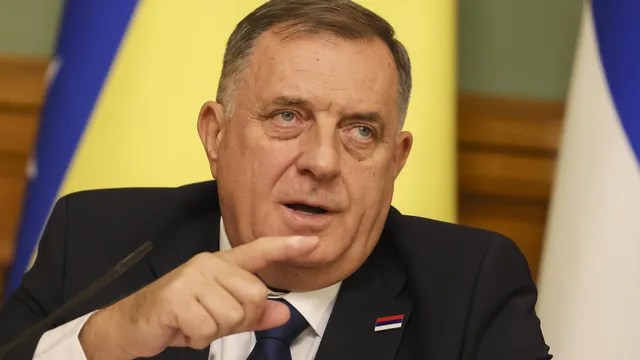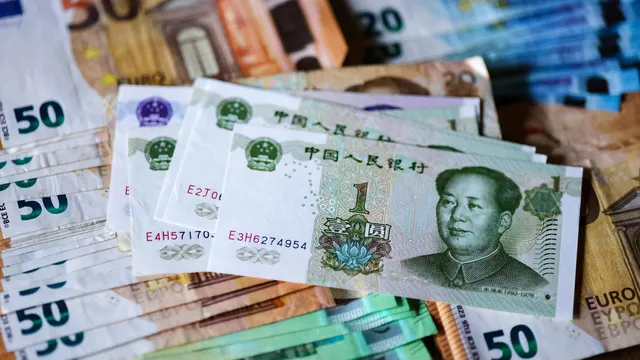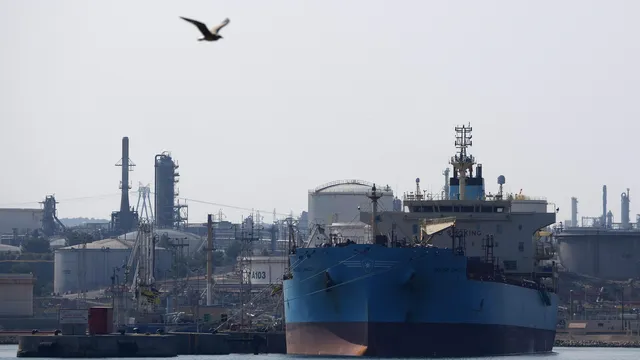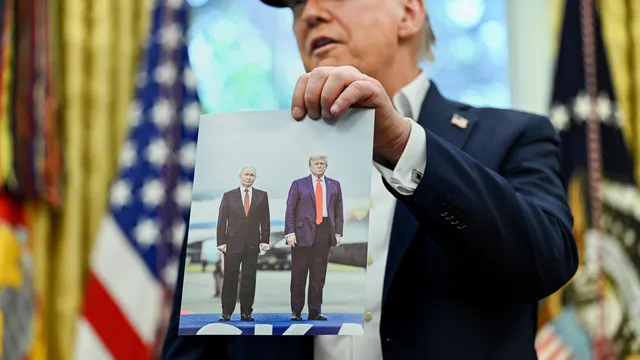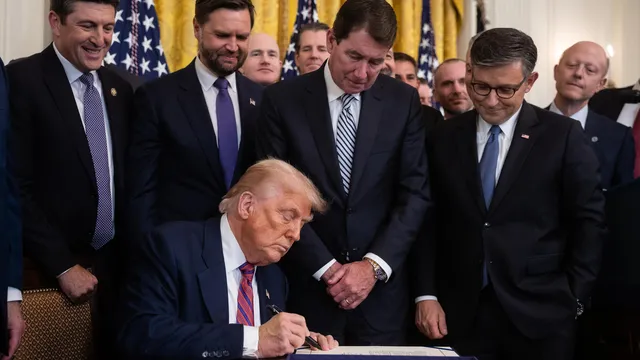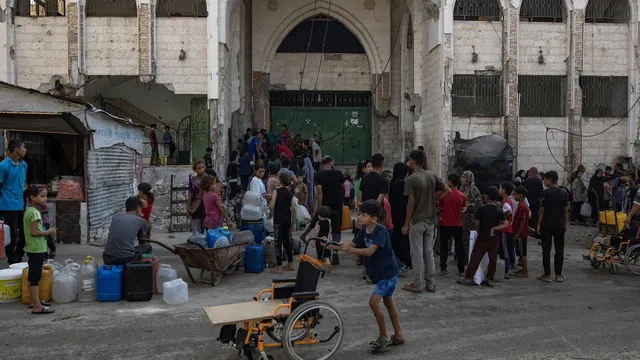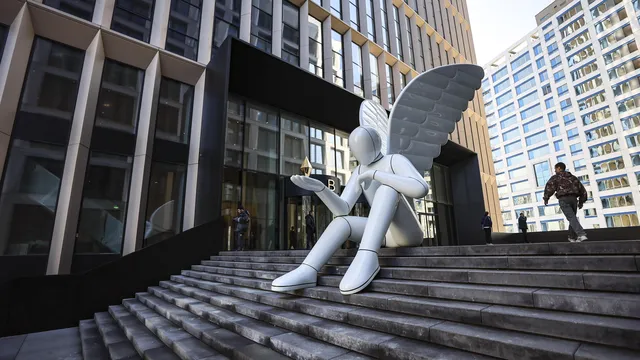All the central streets of Banja Luka are covered with giant billboards praising the ousted president of the Republika Srpska, Milorad Dodik.
Last April, in the midst of a legal saga, he displayed three raised fingers accompanied by the slogan: "President Dodik, in the name of all!" On August 18 this year, Dodik was finally stripped of his presidential mandate by the Central Election Commission (CEC). He is also banned from holding any political office for six years.
At the end of August, the People's Assembly of the Republika Srpska approved the organization of a referendum on October 25, 2025. Citizens will be called upon to reject the decisions of High Representative Christian Schmidt, the decisions of the Court of Bosnia and Herzegovina, and the CEC's removal of Milorad Dodik from office. In response, the CEC immediately reacted and announced that this referendum "will have no legal value" and called for early presidential elections on November 23, a vote that the RS authorities rejected.
Despite his dismissal, Milorad Dodik continues to act as if he is still in power. On September 2, the National Assembly approved a new government that he himself proposed, even though the Constitution stipulates that only the incumbent president can appoint a prime minister. This illegal government nevertheless took office on September 9. Eleven members of the House of Representatives of the Parliamentary Assembly of Bosnia and Herzegovina have filed a petition with the Constitutional Court to review the validity of this decision. "First, we must wait and see what the Constitutional Court of Bosnia and Herzegovina will say about the legitimacy of the new RS government. This is the same Constitutional Court of Bosnia and Herzegovina whose legitimacy Milorad Dodik himself recognised when he appealed its decision," said Igor Cernadak, leader of the parliamentary faction of the opposition Party of Democratic Progress (PDP).
Dodik continues to use the same narrative, positioning himself as the sole defender of Serbian identity, especially in the face of attacks from Sarajevo.
This referendum marks the culmination of the confrontation between the institutions of the Republika Srpska and those of the Bosnian central state, after months of unprecedented legal wrangling. "We are witnessing the Palestinianization of the Republika Srpska, with increasing isolation on the European stage and unrecognized institutions," laments Aleksandar Savanovic, director of the Department of Political Science at the University of Banja Luka.
"Dodik always uses the same narrative, positioning himself as the sole defender of Serbian identity against attacks from Sarajevo. The referendum is a test of his popularity, but the citizens do not support him. Of course, the regime will change the results and present them as a great victory. But people are not fooled," says political analyst Tanya Topich.
Behind this scenario lies an entire system. The end of Milorad Dodik would lead not only to the fall of a single politician, but also to the end of his entourage and the networks built around him. For MP Nebojsa Vukanovic, chairman of the "List for Justice and Order" (opposition), this is the end of the "Pablo Escobar" system.
Behind this institutional battle lies the challenge of preserving the economic system built by Milorad Dodik and his entourage. At the end of 2024, after several years of sanctions, the US Treasury Department published a report detailing the Dodik family's financial network, referring to his children Igor and Gorica, as well as several companies such as Nimbus Innovations doo Banja Luka and Sirius 2010 doo, created or transformed to circumvent sanctions and seize public funds.
In practice, Milorad Dodik has for years directed all contracts with the RS government to a small circle of companies linked to his family, placing loyalists at the helm and using front men to conceal his control. The catering company Agape, linked to Gorica Dodik, and Best Service, run by his cousin Aleksandar Dobrić, illustrate this modus operandi. According to Washington, this is a veritable system of cronyism and corruption, in which the state serves primarily to enrich the inner circle.
"How is it possible to have so many rich people around him in such a poor country?" wonders Sinisa Vukelic, editor-in-chief of the independent portal Capital.ba. "The entire public budget goes into private accounts. Everything is a source of profit, especially forest management and mini power plants. One of the latest deals concerns mandatory IT equipment for all state institutions, which was won by a company from Dodik's circle."
This analysis is shared by Ivana Korailic, director of the non-governmental organization Transparency in Banja Luka: "We are witnessing a political game that we have known for a long time. A game that consists of buying votes, partners, and positions from people close to Dodik. We are witnessing a process of privatization of local business. What's more, the system puts people who have neither skills nor knowledge at the head of ministries."
Will the October 25 referendum confirm Milorad Dodik's political authority and preserve the economic system he has controlled for more than two decades? "The noose around Dodik is tightening and his party is no longer able to mobilize," notes Tanya Topich. The various demonstrations organised in recent months in support of the nationalist leader illustrate this erosion: the crowds are dwindling and only civil servants, forced to participate, are artificially swelling the ranks. "In theory, the SPS has 200,000 members, but in Banja Luka, everyone rejects Dodik," adds the analyst.
The challenge of the referendum is above all to try to remobilize public opinion, in particular the 1,234,000 voters officially registered on the lists in the Republika Srpska. However, according to observers, the educational bloc now has only 750,000 inhabitants, the majority of whom are over 55 years old. Since 1997, nearly 700,000 people have left the Republika Srpska. How many voters will vote on October 25?
Milorad Dodik now has to face the collapse of his Alliance of Independent Social Democrats (SNSD). Once held in an iron grip, he is beginning to lose his power. In Bijeljina, in the northwestern part of the country, the municipal majority, dominated by SNSD councillors, passed a resolution last week to block the opening of a lithium mine in Maevica. This is direct support for the initiative of Mayor Ljubiša Petrović (SDS, opposition), who is eager to protect residents from this controversial project. This is a real slap in the face for Milorad Dodik, who promised both Viktor Orbán and Donald Trump the exploitation of this mine – and other deposits located in the eastern part of the country – which he claims have a commercial value of over $100 billion. In a further sign of his weakening position, one of his closest associates, Zoran Tegeltija, recently held talks with the British ambassador to Bosnia and Herzegovina, Julian Riley, without Milorad Dodik's knowledge.
Finally, the November 23 elections could mark the end of the SPS's control over the Bosnian Serb entity. "The SPS will ultimately nominate a candidate for the November 23 presidential elections so as not to be displaced, because the opposition will not miss the opportunity," Tanya Topich analyzes. However, this opposition is struggling to position itself, moving its pawns back on the political chessboard. The PDP is still hesitant, despite initial statements that it would not participate in the early elections on November 23.
According to opposition leader Nebojsa Vukanovic, who is "against Dodik and all tyrants," Serbian President Aleksandar Vucic controls both Dodik and part of the opposition. The case of Draško Stanić, mayor of Banja Luka, illustrates this: presented as one of the figures in the opposition to Dodik, he owes his position more to a pragmatic and calculated strategy than to a genuine ideological break. A loyal supporter of Aleksandar Vučić, he benefits in return from his favours, in the name of the political imperative shared by the ruling class of the Republika Srpska and that of Serbia: "to demonstrate unity, even if Dodik has lost the support of part of Serbian public opinion, just as Vučić did in the RS." Despite the uncertainties, Milorad Dodik's latest statements suggest that the SPS will participate in the elections. Several names are already circulating: those of Igor Dodik, the son of ousted president Željka Cvijanović, and current interior minister Sinisa Karan.
"EUFOR is not intervening in what is happening, and that is a mistake. If they want peace in this country, they will have to speak up," says Stefan Blagich, president of the Restart association. The young activist, who leads the protests that sometimes shake the Republika Srpska, says that Milorad Dodik's promises "are not worth a penny." However, the recent meeting between Milorad Dodik and Russian Foreign Minister Sergey Lavrov may change the situation. The Russian minister said he would "remain impartial on October 31, when Russia, which will chair the UN Security Council that day, will plead Dodik's case, arguing in particular that High Representative Christian Schmidt is trying to usurp power in Bosnia and Herzegovina." For its part, NATO confirmed its support "for the sovereignty and territorial integrity of Bosnia and Herzegovina," adding that the Alliance will continue "to support the state institutions of Bosnia and Herzegovina, as well as the work of the Office of the High Representative." Ordinary citizens, however, remain in a state of anticipation. I BGNES

 Breaking news
Breaking news
 Europe
Europe
 Bulgaria
Bulgaria
